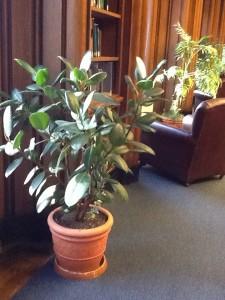
One of the most common indoor potted plants is the rubber plant (Ficus elastica). There are two rubber plants in the Library, one at each end of the main Reading Room. They have been here for about ten years, and during that time, have been pruned on several occasions. Cuttings taken by Library staff are flourishing elsewhere.
The plants thrive indoors, but need a frost-free habitat to survive outdoors, where they can grow to become very large trees, sometimes as a parasite strangling the host. Though rubber has been produced from its latex secretions, it is not the same tree that is used for commercial production of rubber. The latter, Havea brasiliensis, originated in the Amazon region.
The plant belongs to the fig family, along with others such as the banyan tree (Ficus bengalensis) and the Bo tree (Ficus religiosa), and are commonly found in many countries in Asia. In the Philippines it is known as the Balete (Baliti) tree. Preparations made from some varieties are used in traditional medicine: as dressings for wounds, cure for headaches. It is also believed to be of benefit in treating liver disease.
The Balete tree has a significant place in the folklore of the Philippines. It is considered to be a magical place – an abode for supernatural beings. Most Ficus tree trunks have a hollow space surrounded by rooted tendrils forming hardened stems/trunks. This space in the Balete tree is sometimes used for sorcery rituals.
Tina, who keeps our Library clean and tidy, mentioned that back home in the Philippines her mother would not allow rubber plants inside the house because “they attract snakes”. There is some basis for this belief – many snakes climb trees, hunting for birds, and for eggs in birds’ nests. Ophidians are not known to be indigenous to the Bloomsbury area, and we do not expect to find snakes among the Library rubber plants.
(Three people who were born in the Philippines, work in the Library, and were interviewed for this short report.)






